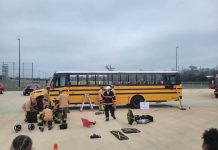EGG HARBOR TOWNSHIP – New Jersey Motor Vehicle Commission Chairman and Chief Administrator Raymond P. Martinez joined state legislators and a local elementary school class for an event to highlight the state’s school bus inspection program that looks at 24,000 student transportation vehicles twice a year.
Speaking at the Egg Harbor Township Board of Education school bus maintenance garage, Martinez stressed that the MVC “does not kid around” with the safety of school buses.
“As we start the school year this week and parents tick off their back-to-school checklists, they should be able to entrust their local school districts with their most precious cargo and know their child will be safely transported to and from school,” Martinez added.
“From the young students who are with us today and are just starting their educational journey, all the way up to high school seniors, the children in this great state have the right to be transported safely,” said Martinez.
The MVC’s mobile inspection team was on hand for one of its scheduled inspections of the township’s 123 school buses. Joining the inspection team with clipboards in hand was a second grade class from the H.R. Swift Elementary School in Egg Harbor Township.
With over 180 items regularly checked on each New Jersey-registered school vehicle, the MVC’s School Bus Inspection Unit ensures that only the safest vehicles are permitted to transport students. Additionally, the unit’s teams of inspectors carefully review gas and diesel emissions for each school bus, as well as maintenance and daily driver reports.
Also available online is the MVC’s new School Bus Safety Activity and Coloring Book. The book, which can be downloaded by teachers and parents alike, is designed to teach youngsters what they need to know about how to act safely on the school bus.
At approximately 1,300 locations statewide, 24,000 school vehicles, including school buses, small school vehicles, dual-purpose vehicles and summer camp vehicles, are subject to scheduled inspections every six months by the MVC. Access to vehicle fleet locations for on-site inspections, which is provided under the School Bus Enhanced Safety Inspection Act, allows for better monitoring of carrier operations and maintenance procedures, interaction with mechanics and operational staff, access to inspection and repair records and the ability to ensure more timely inspection of vehicles.
The MVC’s total yearly inspection count for the semiannual process is over 86,000, which include re-inspections. Of those vehicles inspected, 47.17 percent are placed out-of service, while 19.66 percent are issued 30-day rejection stickers. Violations can range from serious issues, such as brake and steering system problems, to minor defects affecting interior dome and step lighting. Most times, the violations issued are addressed and re-inspected during the same visit. Once the MVC has re-inspected the vehicles, approximately 91 percent are deemed safe for the road.
“As with the inspection of any school vehicle that transports children, MVC inspectors are meticulous in their efforts to detect major and minor defects,” said Martinez. “It is this dedication to school bus safety that demonstrates to the citizens of New Jersey that we are providing a true benefit.”
In addition to scheduled inspections, the School Bus Inspection Unit also performs monthly, unannounced inspections with the New Jersey State Police as part of the New Jersey School Bus Task Force. These inspections are performed to ensure that bus companies and school districts are keeping accurate records and completing regular maintenance on their buses in the months between the MVC’s visits.
Along with making sure all school vehicles are safe and in good working order, the MVC’s School Bus Inspection Unit also ensures all drivers are properly licensed and have their paperwork up to date. In New Jersey, all individuals who wish to transport students must have a Commercial Driver License (CDL) with “P” (passenger) and “S” (school bus) endorsements. To obtain and keep a CDL and the proper endorsements, drivers need to meet several criteria, which include undergoing a thorough criminal background check and a complete medical review.















